|
Cards on the table. I have a long-standing fondness for cult and exploitation cinema in all of its guises, but my passion for some genres is stronger than it is for others. Get me on 70s martial arts or horror cinema and I'll prattle on for ages, but when it comes to Italian westerns – the so-called 'Spaghetti Westerns' from the 60s and 70s – there are still some sizeable gaps in my knowledge and viewing experience. I'm a serious enthusiast for a good many of the films that I have seen, for sure, but in recent years especially have become all too aware of just how few of these movies I've managed to see over the years. Like many, I'm sure, I came to the genre through the work of Sergio Leone, and many years ago, thanks to the National Film Theatre and my trusty student railcard, saw the whole Dollars trilogy on the big screen on a single afternoon/evening, and a couple of years later sat in the front row of a very big cinema for the (then) newly reconstituted director's cut of Leone's magisterial Once Upon a Time in the West. In the years that followed, I caught up with a couple of the Django films, the first two Sabata films, all of the Trinity movies and, more recently, a few lesser-known gems such as Cemetery Without Crosses and Face to Face. Yet until the news story of this Blu-ray release landed in our inbox, I confess to having never seen nor even been consciously aware of the Sartana movies.
If you're similarly unfamiliar with the individual who featured in the five films in this collection and made appearances in a string of unofficial spin-offs, then a brief introduction might be in order. In common with the lead characters in the movies from which this series draws influence, Sartana is a gunslinger of extraordinary skill whose past is a mystery and who is frequently driven by the pursuit of riches. His immaculate black attire gives him the look of a preacher who part-times as a matador and takes fashion tips from the man who makes Dracula's cloaks. He has a six-shooter on his hip and sometimes slings a rifle over his shoulder but rarely shoots with either, preferring instead to surprise his opponents with a custom-made, four-chamber Derringer. And he's a crack shot. If Sartana shoots at you and you're not instantly killed, you can usually be sure it's because he didn't want you dead. Yet he doesn't just rely on his shooting skills to get him out of trouble, being also adept at ingeniously improvising with whatever he has to hand to get him out of a fix or to outwit an opponent.
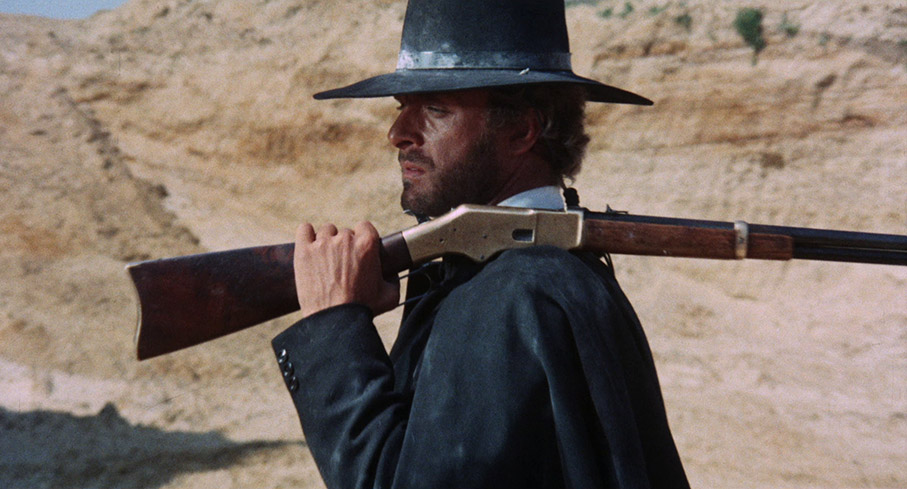
Sartana also has an almost supernatural ability to second-guess an opponent's every move. Try to surprise him by leaping into his room through the window and he'll have probably rigged a trap to incapacitate you. Run away and he'll somehow get ahead of you and be waiting for you when you reach your destination, and if you're daft enough to make plans to go looking for him, then I'd check your surroundings because it's quite possible he's in the immediate vicinity and listening to everything you say. He's also one hell of a gambler and if you play him at cards then you're likely to lose; if you win, it's because he wanted you to and then you know for sure that he's up to something. Of course, he may also use those cards to bemuse you with his magician's sleight-of-hand, and in one of the films they even become a tool with a Swiss Army Knife range of possible uses. He has a fondness for gadgets and intermittently pauses his pursuit of riches to investigate a mystery, come to someone's aid or even clear his own good name when wrongly accused. And unlike the amoral antihero of the Dollars films, you do get the impression over the course of the series that there's probably a decent and principled human being underneath his surface cool and his willingness to shoot anyone who gets in his way.
Sartana was played in four of the five films by Gianni Garko, with whom the character will be forever associated, but for one film only was played by George Hilton, who brought just a touch of humour to the character before being ousted for the enigmatic Garko's return. Similarly, while four of the films were directed by Giuliano Carnimeo (under the English-sounding pseudonym of Anthony Ascott), the first was helmed by Gianfranco Parolini (as Frank Kramer), who would then go on to direct the Sabata trilogy. Impressively, all five films are of a similarly high quality and are consistently entertaining, despite a daffier use of gadgetry in the final film. And even within the no-nonsense realm of the Italian western, the Sartana movies have some of the most distinctive titles, all of which read like dire warnings of the consequences of tangling with someone of Sartana's lethal skills.
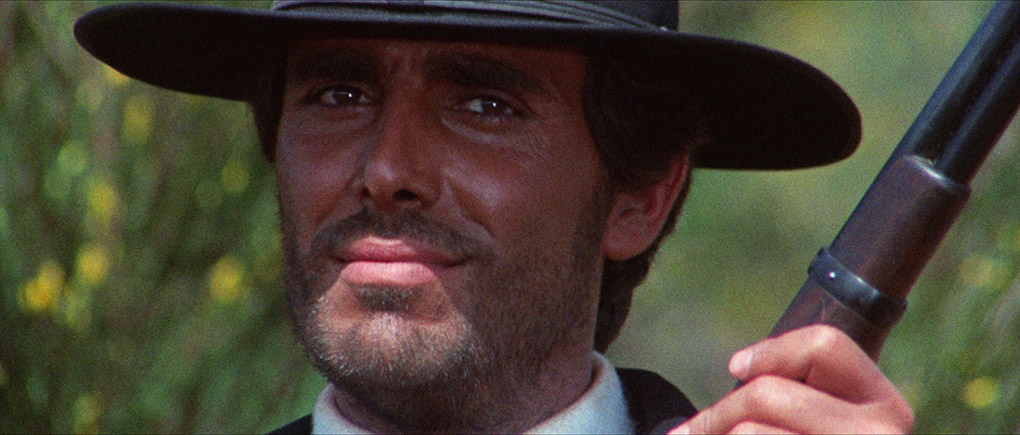
Due to the fact that there are five films and a lorry-load of extras, I've elected not to cover the individual films at our usual exhaustive length, so instead have provided an overview of the content and the specific qualities of each. The technical specs and special features for all five films are covered after the films themselves.
| If You Meet Sartana… Pray for Your Death |
|
As the title for a spaghetti western that introduces a hitherto unseen lead character, If You Meet Sartana… Pray for Your Death is both a belter of a sell and a little misleading, as judging by what happens when Sartana is threatened by anyone, if you meet him you'll be dead before you can utter a word of a prayer.
Even if you came to this first film with no knowledge of its content or genre, you'd have little trouble pinning it as a spaghetti western from the off. Signifiers include the multinational cast who deliver their dialogue in obviously dubbed English or Italian (you can take your pick), the high body count, a callous disregard for human life and that very specific gunshot sound that you'll find in no other genre, including westerns made rather than ostensibly set in America.
Pray for Your Death delights in its narrative double-crosses, which on occasion follow on from each other in the sort of quick succession with which mishaps are delivered to Wile E Coyote in the Road Runner cartoons. Seriously, try this for size (and despite the fact that this happens early on, if you want avoid spoilers, hop ahead a paragraph). Just a few seconds after a group of stagecoach passengers introduce themselves to each other and the foundations are laid for a possible future romance, they're attacked and murdered by a Mexican gang. The bandits, it turns out, weren't after the passengers or their money or jewellery, but a strongbox of gold that is hidden in the back of the vehicle. No sooner have they taken possession of it, however, than they are killed by a second gang that also has eyes on the gold. Having taken possession of it, the entire gang is then slaughtered by its leader, Lasky (William Berger), so that he can keep the gold for himself. When he opens the strongbox, though, it only contains rocks, the real gold having been hidden by politician Stewal and banker Alman as part of an insurance fraud.
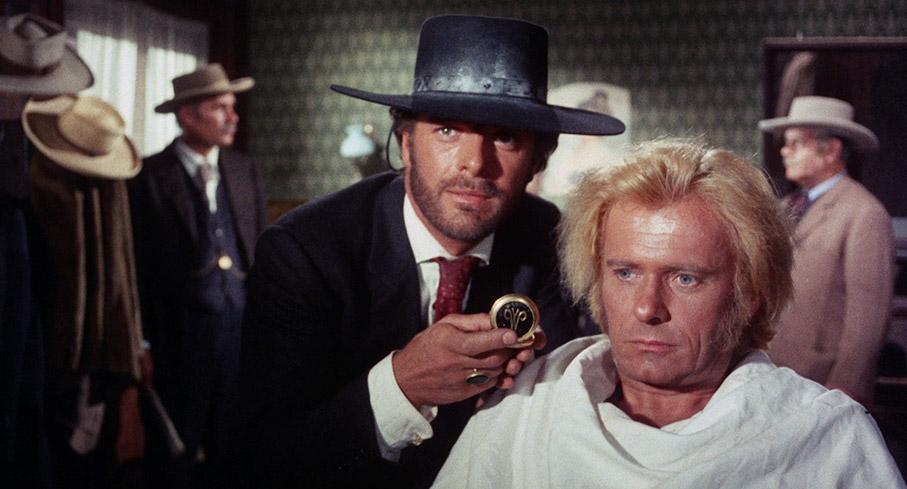
The gold is quickly established as a prize that just about everyone is trying to get their hands on, and none of them has any scruples about killing anyone who tries to stop them. I've seen it speculated that Sartana may not be a bandit but an insurance agent sent to investigate the fraud and recover the gold, but if that's the case then the American West was definitely not a place to be caught trying to pull an insurance scam. And given that this sub-genre is built on the twin motivators of revenge and lust for riches, it seems unlikely that a man such as Sartana would have such pure motives, however extreme his methods might be.
There are borrowings aplenty from Sergio Leone's Dollars trilogy, particularly For a Few Dollars More, a kinship emphasised by the presence of Klaus Kinski as sharpshooting gang leader Morgan, the scope-framed close-ups of eyes at tense moments, the use of a musical watch to unsettle an opponent, and a climactic gunfight that cannot begin until signalled to do so by an improvised timer. And I doubt it's a coincidence that the nearest Sartana comes to a sidekick here is a craggy old undertaker with a penchant for cackling, which plays like a nod to A Fistful of Dollars.
Being my first encounter with the Sartana series, it took me a while to really warm to the man, and having accepted him as a taciturn gunslinger in the opening scenes, I was a thrown a little when he visits a saloon and a more approachable side to his personality emerges, as he flashes his James Franciscus smile at the ladies and wins and card games seemingly just for the fun of doing so. When he's foolishly challenged outside by the losers, however, his former persona returns in a heartbeat. What really hooked me was his ability to outthink his opponents and predict their moves, a skill amusingly showcased when he follows a saloon girl to her room then insists on tying a rope to the back of a rocking chair for what at first looks like the preparations for an unspecified sex game but… no, I'll let you discover the purpose of that one for yourself.
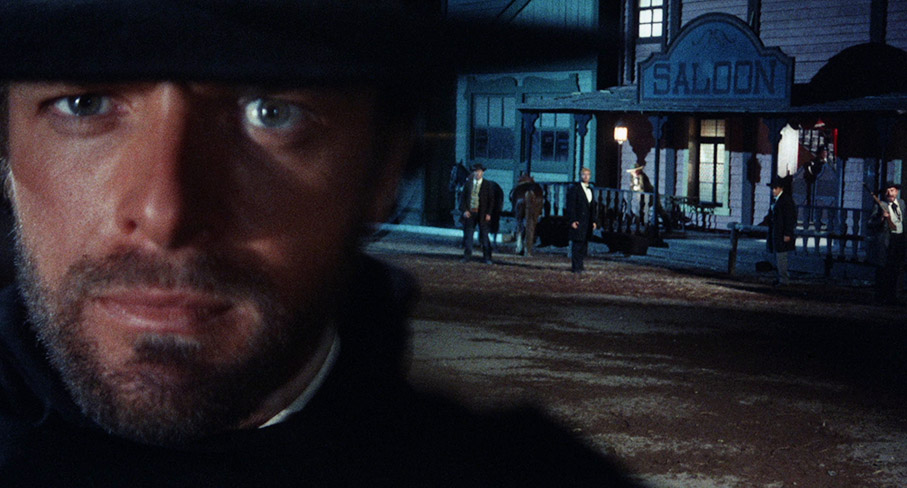
If you Meet Sartana… Pray for Your Death is a seductive and hugely entertaining introduction to the title character. It's solidly directed by Gianfranco Parolini, whose blocking within the 1.85:1 frame is smart and intermittently classy, notably in a split-diopter shot in which a close-up of Sartana's face is framed against a wide shot of the men who have made the mistake of challenging his card-playing honesty. A tad less inspiring is the Mexican gang, who play up to western cliché when they capture Lasky by laughing like an audience at the funniest stand-up comedy routine in human history as they drink and beat him silly. It's not that funny, guys.
In common with the other four films in this collection, the dialogue has all been post-dubbed in both English and Italian, and both soundtracks have been supplied for each film, plus optional English subtitles for the Italian track. On this film the majority of the dialogue appears to have been delivered in English on set, and as a result it's the English language track that most closely matches the mouths of the actors. That said, the voice of the actor dubbing Klaus Kinski differs so dramatically from Kinski's actual voice that I actually let out a small yelp when he started speaking.
| I am Sartana, Your Angel of Death |
|
Having rather warmed to Sartana as a ruthless and avaricious anti-hero in the manner of Clint Eastwood's Man With No Name in the first film, it was initially a tad disarming to have him presented in the second as a man trying to clear his name after he is wrongly identified as a murderous bank robber. Of course, being Sartana this tends to involve confronting people and dispatching them in sometimes creative fashion, but there's no doubt that he is being presented as the good guy here. He even has a roguish sidekick in the shape of Buddy Ben (played by Corman graduate Frank Wolff), a scruffy old comrade who's happy to come along for the ride and whose shooting skills are good enough for him to provide the necessary backup when required.
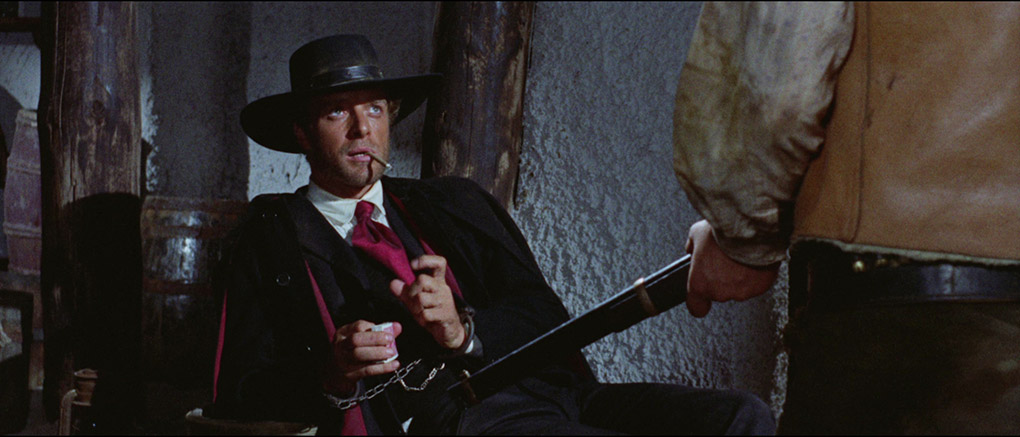
It all kicks off when a bank is robbed and its staff is slaughtered by a gang led by Sartana, except we all know it's not actually Sartana because the voice is all wrong and we never see his face. Suddenly, Sartana is public enemy number one and there's a $10,000 bounty on his head. Everyone's out to get him, including a gambler and sharpshooting gunslinger named Hot Dead, with whom Sartana seems to have a bit of a history. As seemingly everyone and his mother sets out to claim the bounty, Sartana embarks on a quest to prove his innocence and track down his mysterious impersonator.
Right from the off, I Am Sartana, Your Angel of Death feels even more energised than its predecessor, notably in the almost Wild Bunch-like wind-up to the opening robbery, and in director Giuliano Carnimeo's fondness for tumbling the camera when someone is shot as if it's connected to them and is pulled over as they fall. Casting Sartana as a victim on a righteous quest also helps to further humanise him, which is doubtless aided by Gianni Garko's increased familiarity with a role that he was effectively road-testing in the first film. It's certainly easier to root for him here, particularly with the odds stacked so heavily against him, which allows us to sit back and enjoy the inventive methods he employs to get himself out of trouble. Thus, when he allows himself to be placed under arrest, you just know he's got a trick or two up his sleeve to break free later, and if he's trapped behind a wagon by a gang of armed men then don't fret, because he can rig up a trap with the dynamite he's been concealing in his pocket all along. My favourite piece of trickery has him seemingly cornered in a barbershop by a bounty hunter, whom he fools by disguising himself as a hat stand. I know that sounds odd, but it really works.
Klaus Kinski returns from the dead in the new role of white-dressed gunslinger Hot Dead, an entertaining creation who, despite being even more fond of gambling than Sartana, is just dreadful at it and never wins a game. At one point he catches his opponent cheating, and instead of shooting him in the favoured western manner, he neuters the man's advantage and continues with the game. "Don't cheat," he warns his opponent, then adding wearily, "I'll lose anyway"* before flashing a quick conspiratorial look at the camera. But Hot Dead is also a perfect example of the problem of post-dubbing. Quite apart from the fact that we all know how Klaus Kinski actually sounds, there's a stark and character-changing difference between the Italian and English dubs of this character. On the Italian track, he's as gruff as any Italian western villain, but on the English language track he's probably the campest cowboy in the west, which did leave me wondering how Kinski actually played him.
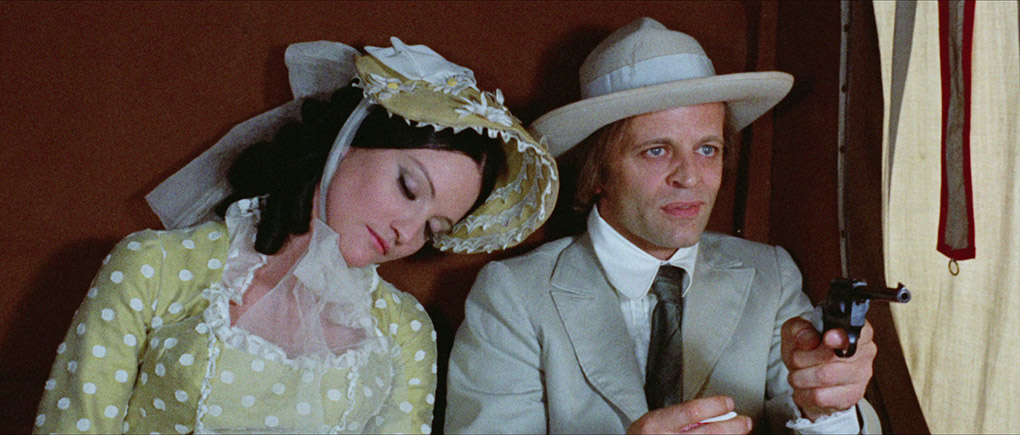
In the end, it does the film no harm and if anything makes Hot Dead more colourful in his English language incarnation, adding another layer of interest to a film that rivals Have a Good Funeral My Friend… Sartana Will Pay as the best of the Sartana films. Even the opening titles have a touch of class here, a specially filmed sequence that subtly underlines the notion proposed on the commentary track that Sartana is in some ways a western James Bond.
| Sartana is Here... Trade Your Pistol for a Coffin |
|
The first thing that hits you about the third film in the Sartana series is that Sartana himself is not the man he once was. That's not meant as a slight on his manhood or singular skills, but a first reaction to the fact that this is the first and only film in the quintet in which Sartana is played by George Hilton rather than Gianni Garko. The adjustment required is not as jarring as expected (the Bond switch from Connery to Lazenby this is not), but for the first ten minutes or so I couldn't shake off the sense that I was watching someone imitate a character I'd got to know and rather like over the course of two films, a process I now had to restart with this imposter. It didn't take long. Despite a language switch (more on that in a minute), I quickly forgot about this change of identity and settled back to enjoy more of the exploits of this likeable rogue, a term I use in part because I'm not sure how else to describe what Sartana has developed into by this point. He still dresses and behaves like a mysterious stranger, but everyone knows his name and despite his high kill ratio, he seems to be settling on the side of good, or at least what constitutes good in this lawless version of the American West.
It all kicks off here when a covered wagon is ambushed by Mexican bandits, who then depart without spoils and attempt to blow it up with dynamite. The fuse, however, is creatively extinguished by a secretly watching Sartana, who hauls one of the bodies of the murdered men onto his horse and takes it back to town to collect a bounty, where he gets a tip that takes him to a small outpost where the Mexican gang have set up home base. When Sartana rolls up, their leader Mantas (Nello Pazzafini) is out of town, and when the child of a woman the gang is keeping prisoner runs out and begs Sartana to free his mother, it's only a matter of time before the outpost is swept clean of bandidos.
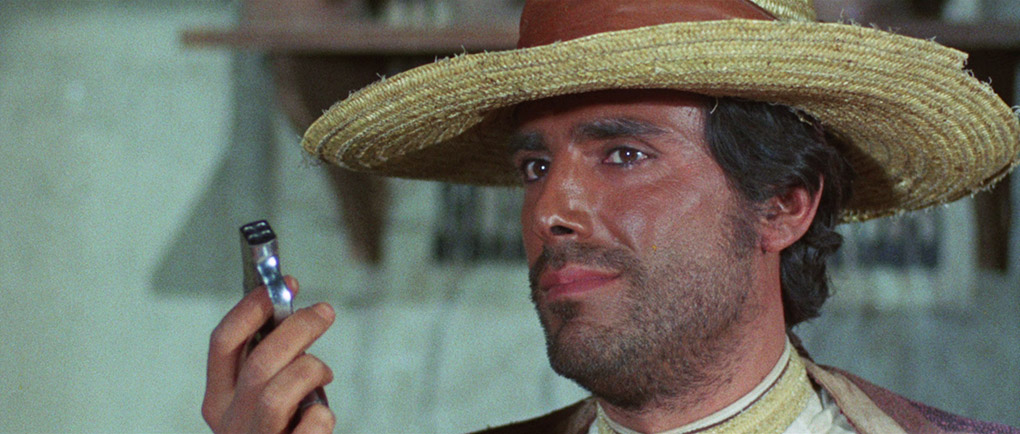
By this point I'd fully engaged with Hilton as the replacement Sartana, but still didn't have a clue where the story was going or even what it was. It soon becomes clear, however, that there's a shipment of gold that everybody wants to get their hands on, one that its foolishly trusting owner is willing to hire Sartana to protect. But wait, there's another gunslinger in town who might be better for the job, a white-dressed, straw hat-wearing, sharp-shooting dandy who carries a ladies' parasol to shield himself from the sun and who is so good a card player that he even beats Sartana. His name? Sabata. Hang on a second, Sabata? The Sabata who has his own film the previous year, where he was played by genre icon Lee Van Cleef? It certainly looks that way. There is, I gather, no direct relation between the two films – here Sabata (played by American actor Charles Southwood) was simply brought in to provide Sartana with an equally skilled foil whose reputation was equal to his own. For the sake of character clarity, he's undergone a bit of an identity change – Van Cleef's Sabata shared Sartana's all-black wardrobe, and the decision to kit him out in white here was presumably made to make it easy to tell him and Sartana apart from any distance. He also favoured an unusual multi-chamber Derringer, which was probably seen as a little too similar to Sartana's weapon of choice, so here he wields a sawn-off Winchester rifle, with which he can shoot the antenna off an ant at a hundred paces. Probably. But it's Sabata nonetheless, and while he's not as enigmatic as Van Cleef (or indeed as Yul Brynner, who played him in the sequel, Adiós, Sabata), he's Sabata nonetheless, and from this point on I had the enjoyable sensation that I was getting two spaghetti westerns for the price of one.
As the final act unfolds you'll probably need a notebook, a pen and a calculator to work out and keep track of who is double-crossing who, but it builds to a splendid climactic stand-off between Sartana and Sabata and a neat twist that delivers a surprisingly upbeat ending, albeit one that mirrors that of the preceding film. Director Giuliano Carnimeo drops his trick of having the camera tumble with the victims of shootings, but still plays the odd experimental games with film form, notably when Sartana shoots three men in rapid succession and the screen divides to simultaneously show all three falling to their deaths.
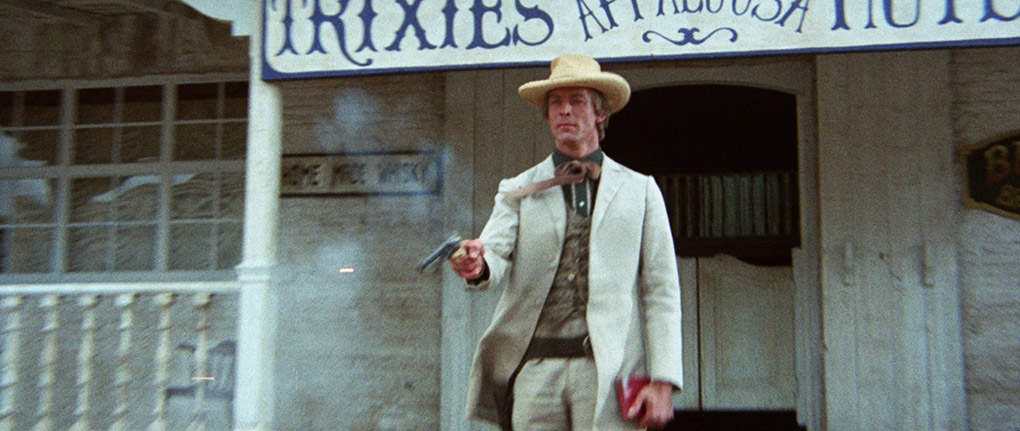
One thing that does seem to have changed for this Sartana outing is that the actors appear to have delivered their lines in primarily in Italian rather than the English of the two preceding films, and for the first time the Italian dub is a far better fit than the sub-par English one. But for the most part, the switch to a different lead is a seamless one, and despite taking its sweet time to settle into a story of sorts, Sartana is Here... Trade Your Pistol for a Coffin is a worthy and enjoyable entry into the series.
| Have a Good Funeral My Friend… Sartana Will Pay |
|
Gianni Garko is back for this fourth entry in the series, but he's undergone a bit of a style shift that has sheared him of his distinctive three-day dark beard and kitted him out instead with a thick blonde moustache that makes him look more like a handsome banker than a fearsome gunslinger. And there's something about his countenance and delivery (the clunky English dubbing really doesn't help here) that suggests Garko wanted to rethink the character a little, perhaps to distance him a little further from Eastwood's Man with No Name, which was clearly a key influence on the character's original incarnation. He even has a brief romantic encounter with a girl he's looking to do business with, an aspect of his character there was no trace of in the previous films.
Thankfully, however, he still has the skills that for which he is primarily known. Early on, he uses a mirrored pocket watch both to observe the movements of would-be muggers and to creatively incapacitate them. And here he does more than win money with his playing cards, which appear to have been forged from razor-edged steel and are employed to do everything from extinguish a candle flame to disarm an opponent and even mark a specific passage in the Bible for his victim's edification.
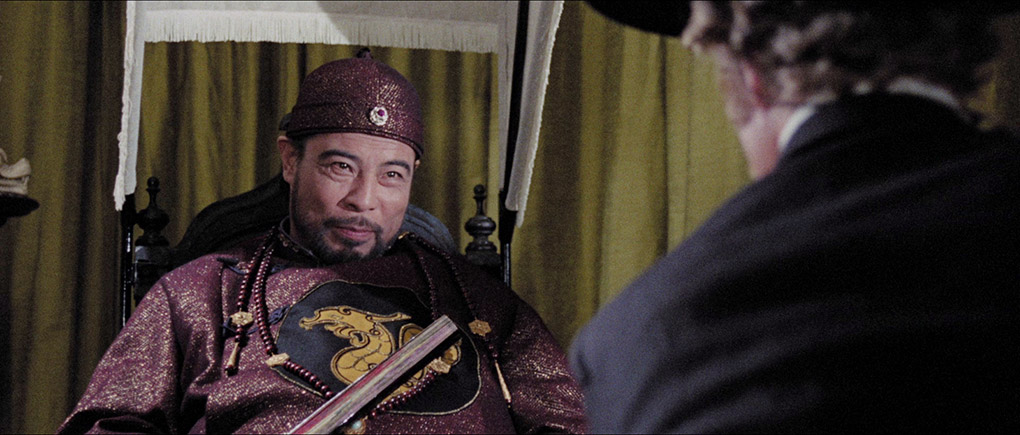
The plot revolves around a strip of land on which a group of gold prospectors is murdered in the opening scene, shortly after which Sartana shows up and wipes out the killers, though not before one of them discovers a sizeable gold nugget that suggests the prospectors were really onto something. Not long after, Sartana ambles into a gambling house run by crooked Chinese businessman Lee Tse Hung (George Wang), with whom he plays cards and to whom deliberately loses, which instantly tells us that he's up to something. When the niece of the prospector who owned the land on which the gold mine is located rolls into town, Sartana offers to help her, and using a letter of credit that may or may not be false, kicks off a bidding war for her newly inherited property.
Despite the beautification of our leading man's phizzog, this is Sartana firing on all cylinders. The plot is busy enough to require your full attention, and the conflict is action-packed and often creatively colourful. An attempted assassination in a barbershop leads to an exciting chase in which the bodies of the would-be killers fall into the coffins in which they were hiding as Sartana picks them off from the back of a galloping horse, and just this one time Sartana isn't the only one with an ingenious but lethal gadget at his disposal. I also let loose a smile when the fearsome Piggot outlaws are introduced in low-angle silhouette like the Four Horseman of the Western Apocalypse. Yet nothing prepared me for Sartana's climactic confrontation with Hung, who defies expectations created by his bulk and his leisurely countenance by leaping to his feet and doing battle using martial arts and a samurai sword. Which is a Japanese weapon. Oh, it doesn't matter.
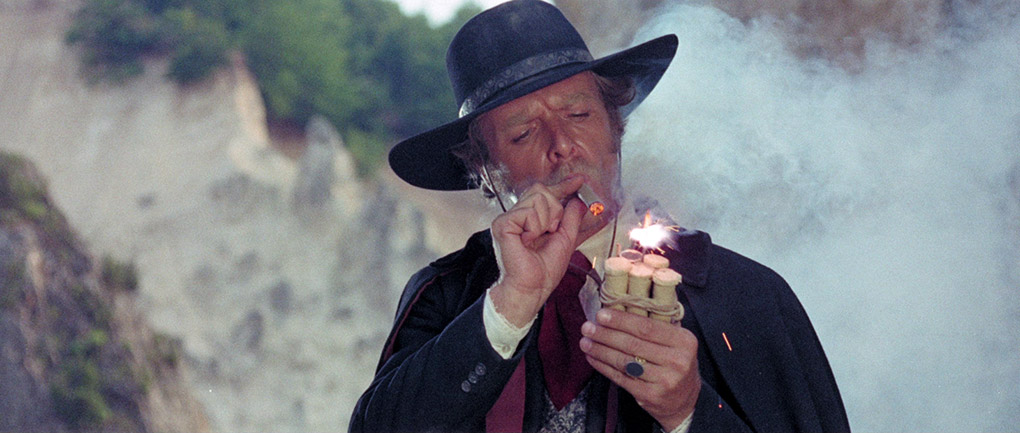
As with the previous film, the Italian track seems to play better than the English dub, in part because of some particularly naff voice acting on the latter, and while the scores for all the Sartana films draw on Morricone's iconic work on Leone's Dollars trilogy, here composer Bruno Nicolai sometimes apes it so blatantly that I'm surprised he wasn't hit by a lawsuit. But this is still a terrific entry into a classy series, briskly paced, busy with incident and handsomely shot and lit by Trade Your Pistol for a Coffin's Stelvio Massi. And in a medium where the law of diminishing returns tends to hold sway, it's refreshing to see a film series still hitting this sort of form four titles in.
| Light the Fuse… Sartana is Coming |
|
After a brief but brilliant opening shot, the fifth film in the series kicks off in by now familiar fashion, as three rogue lawmen beat up and murder a judge in front of his protesting daughter, then Sartana rides up, examines the body and kills his attackers before they can even properly point their guns at him. It's after this that things take an unexpected turn, as Sartana rides up to a walled-off prison town with the bodies of the lawmen and hands them over to the weasel of a warden, who asks the visitor to disarm and then has him beaten and thrown into a cell. This is not one of those cells you'll find in sheriff's offices in any western you care to name, but a deep hole in the ground that is barred at the top, like that one Jesse was confined to in the final series of Breaking Bad. At first it looks as though things have taken an unexpected turn for Sartana, but there's something about a look that he flashes one of the other prisoners, a man with the unlikely name of Grand Full (Piero Lulli), that casts the first seed of doubt about that. All becomes clearer when the warden and his boss press Full once again for the location of the gold, and when he refuses to talk they pour acid on him, something that has a particularly unpleasant resonance today but which leaves Full in pain but with no physical scars. What was it, vinegar? It soon becomes evident that Sartana has had himself thrown into jail for the sole purpose of freeing Full and teaming up with him to pocket a fifty per cent share of the half million in gold and two million in counterfeited banknotes.
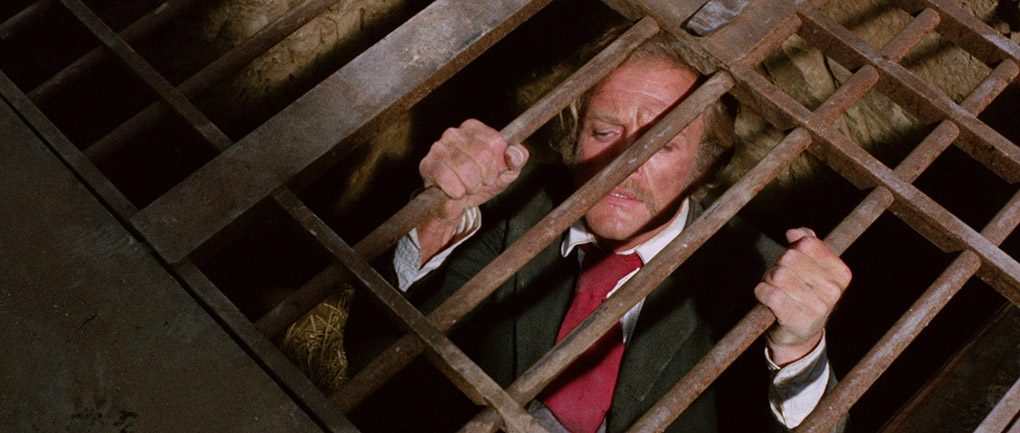
All of the by-now expected boxes are enjoyably ticked in this final official film in the Sartana series, but you'll need to keep your wits about you if you want to keep track of all the people Sartana makes a fifty-fifty deal with, as just about everyone seems to believe that the gold is rightfully theirs. As ever, Sartana finds himself pitched against serious odds, scenes that are once again inventively handled, notably one set in a steam house where no-one is able to see more than a few feet, allowing the almost invisible Sartana to pick off his would-be assassins one by one. He also gets to play the magician again in a neatly staged sequence in which he repeatedly misdirects two lawmen in a way that just would not be possible without the delightful trickery of cinema.
Where the film does push its luck a little is in Sartana's gadgetry, which here moves out of Connery Bond territory into the realms of Roger Moore at its most unlikely. Thus, instead of razor-edge playing cards or a pocket watch that can be swung as a weapon, we have a pint-sized, cigarette lighting robot that Sartana names Alfie and is able to send trundling slowly towards a concealed enemy, who reacts with amusement at a toy that then shoots him or blows up in his face. Even more fanciful is the climactic battle, where impossible odds are evened out a little by an organ whose pipes transform into bazookas and machine guns, a creation that would have taken a team of dedicated engineers several weeks to design and build. It's not that we haven't seen such fanciful reality stretches in other Italian westerns, it's just that if feels a little out of place in a Sartana movie.
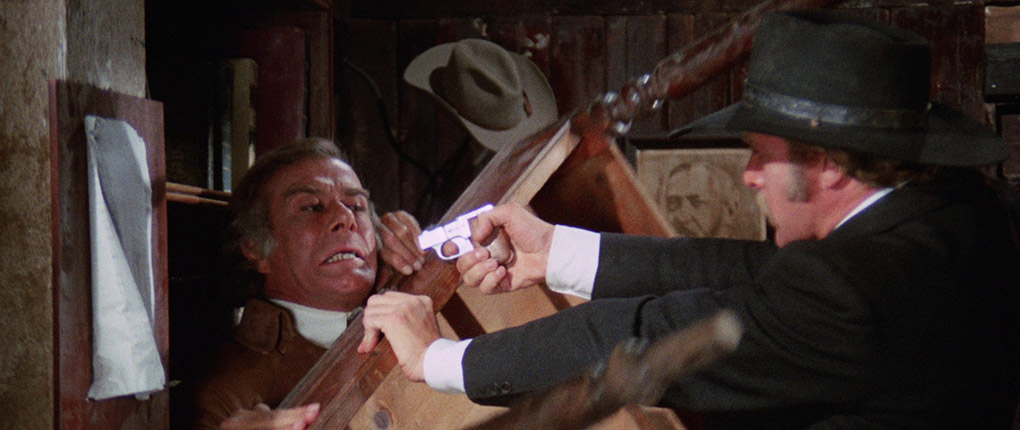
For the most part, though, the film delivers all the hoped-for pleasures and has enough original elements to give it a distinct identity and ensure that it stands out from its predecessors. If I had to pick one film from the series to call the weakest, this would probably be it, but It looks good, plays well and Garko is as enigmatic as ever, and it's nice to see a series with the sort of potential that this one clearly had decide to quit while it's ahead.
All of the films are framed 2.35:1 except If You Meet Sartana… Pray for Your Death, which was shot 1.85:1. All five have undergone new 2K restorations for this release, with If You Meet Sartana… Pray for Your Death restored from the original film elements. The results are generally excellent, though with a couple of small caveats which I'm fairly sure can be blamed on the condition of the materials that Arrow had to work with. Faring worst he is Pray for Your Death, which has a few very visible scratches that I'm guessing were too prominent and on screen for too long to remove without otherwise compromising the image. In other respects, however, the image quality on all five films is consistently impressive. The contrast is generally well balanced, though does occasionally prove beefy enough to tug at the shadow detail, but the picture never looks even remotely washed-out and the black levels are always solid. Colour has also been attractively rendered on all of the films, having a warm feel in places but appropriately so, but vividly reproducing the brighter primes. Best of all on this front is Have a Good Funeral My Friend… Sartana Will Pay whose production design makes more lively use of colour, particularly in Lee Tse Hung's gambling house. Sharpness and image detail are also at their best here and in Light the Fuse… Sartana is Coming, though this element is strong on all five transfers. The aforementioned scratches aside, the films are also free of dust and damage.
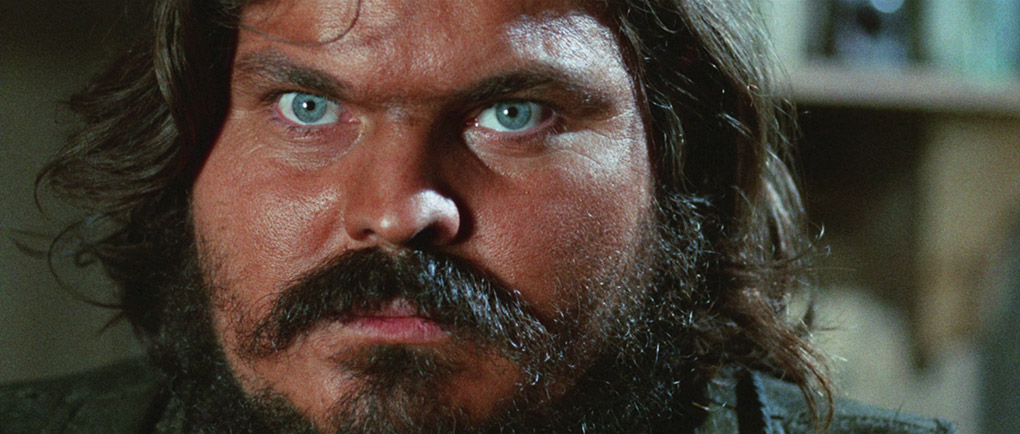
All of the films have DTS-HD Master Audio 1.0 mono soundtracks and for the most part are of similar quality. The dynamic range is inevitably narrowed, with little in the way of bass response and slightly crispy trebles, but the dialogue and effects are always clear on both the English and the Italian tracks, and while the music is also a victim of the range restrictions on most of the films, it has a cleaner, fuller sound on Sartana is Here... Trade Your Pistol for a Coffin. For the most part, the tracks are clean and free of damage and wear, though there are a few instances of audible fluff on Have a Good Funeral My Friend… Sartana Will Pay and hum in some quieter scenes of Light the Fuse… Sartana is Coming, but neither is serious.
Optional English subtitles kick in automatically if the default Italian track is selected, but can be switched on and off manually at any time.
Disc 1
Commentary by Mike Siegel
Filmmaker and writer Mike Siegel, with whom I once briefly corresponded about his tireless and ongoing project to document the films of Sam Peckinpah (his excellent documentary, Passion & Poetry – The Ballad of Sam Peckinpah, is available on German 2-disc DVD,) announces up front that he does not intend to examine the film on a scene-by-scene basis and that his real interest lies in the actors and the filmmakers, whose careers he discusses in educational detail. He also provides quite a bit of information on the 1966 Blood at Sundown, the film that gave birth to the character of Sartana.
If You Meet Frank Kramer... (22:25)
A new interview with writer-director Gianfranco Parolini, who was a sprightly 94 years of age when this was filmed but sadly passed away in April of this year. The director of If You Meet Sartana… Pray for Your Death and the Sabata trilogy looks back at his life and film career in post-war Italy, laments the fact that his beautiful wife now suffers from Alzheimer's and sometimes fails to recognise him, and pays tribute to a number of his former colleagues, including stuntman and former acrobat Aldo Canti, whom he claims was murdered by the police.
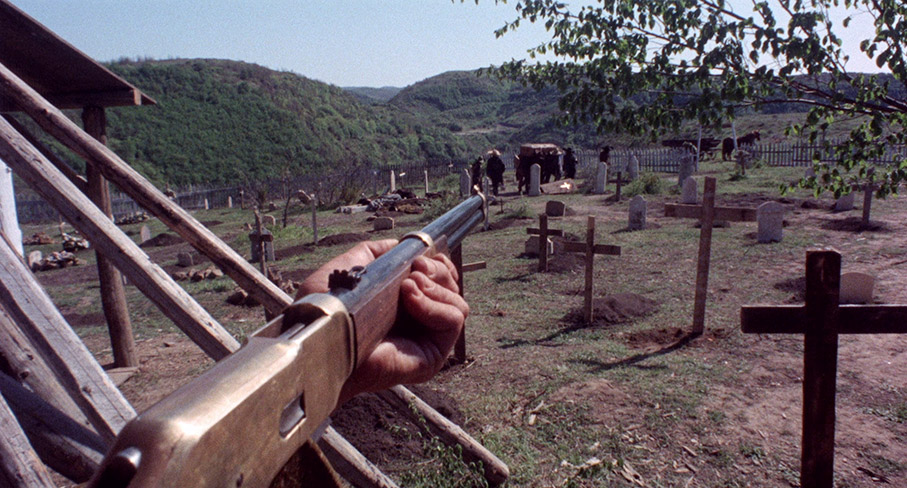
Light the Fuse: Sartana's Casting (16:43)
A visual essay by Jonathan Bygraves that provides textual biographies of Gianni Garko, George Hilton and a number of the key actors in the Sartana films. It's illustrated by muted clips set to music from the films and sub-divided into categories like The Regulars (those who appeared in more than one Sartana film), The Bad Guys, The Women and The Rest.
Gallery
28 slides of posters, promotional shots and front-of-house stills from the film, all from Mike Siegel's personal collection.
Disc 2
Commentary by C. Courtney Joyner and Henry Parke
Screenwriter and novelist C. Courtney Joyner and screenwriter and editor for True West magazine Henry Parke – both self-confessed Sartana enthusiasts (Parke goes a step further by describing himself as a Sartana zealot) – take a different approach to Mike Siegel by focussing largely on the style, technique and content of individual scenes. As confirmed fanboys, they gush over almost every aspect of the film the way I might over something like Seven Samurai, but in the process do highlight elements that you might otherwise not have considered. Just occasionally, though, they do fall into that trap of just describing what's happening on screen and get excited by even the smallest detail. Well worth a listen, nonetheless.
From the Life of a Stuntman (24:18)
Actor and stuntman Sal Borgese recalls a few memorable incidents from his film career, including when his entire work on one feature was cut out, which was particularly galling because they'd had to reshoot it due to a continuity error. He has next to nothing to say about his role in I am Sartana, Your Angel of Death because despite coming across the film recently on TV whilst channel-hopping, he has no memories of making the film. "Maybe I'm getting old," he offers by way of explanation.
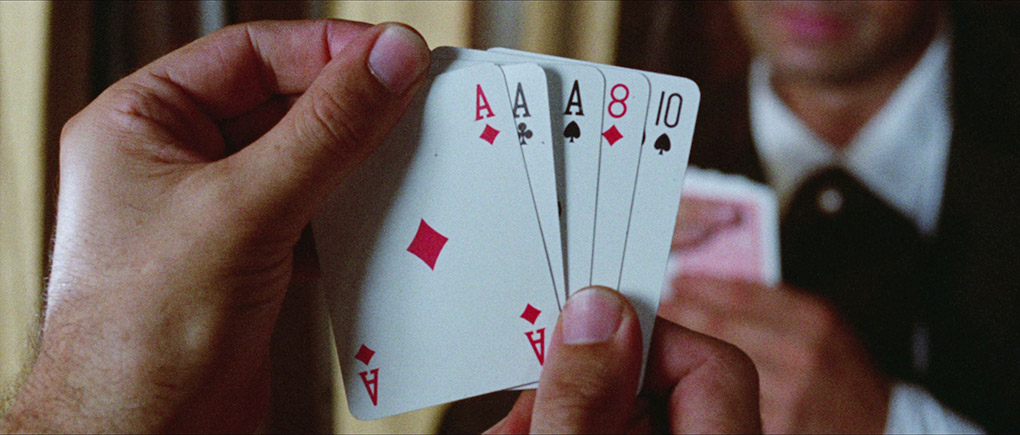
Violent Tales for Kids (19:10)
I am Sartana, Your Angel of Death screenwriter Ernesto Gastaldi recalls moving into westerns after making his name on gialli and James Bond clones, outlines the genesis and development of the Sartana character, claims that westerns were really easy to write (a statement he does provide some justification for) and describes Sergio Leone as a genius who was a little strange in real life.
Gallery
30 slides of posters and hand-coloured promotional stills from the film, again from Mike Siegel's collection.
Disc 3
Sartana Shoots First (20:12)
Stand-in Sartana George Hilton admits that he was never a fan of westerns but credits them with making him famous, and that he owes a great deal to director Lucio Fulci and his 1966 western, Massacre Time. He talks about landing the role of Sartana in Sartana is Here... Trade Your Pistol for a Coffin and the friendship that developed between him and Gianni Garko, and shares his memories of a number of his fellow actors in the film and its director of photography, Stelvio Massi. He's also not the first interviewee in this set to suggest that Italian westerns of the period were superior to American ones. Discuss!
Lady Colt (29:21)
A still fetching 75-year-old Erika Blanc, who plays saloon owner Trixie in Trade Your Pistol for a Coffin, looks back at her career in Italian B-movies films, particularly westerns, including her role in the 1966 Blood at Sundown, the film that gave birth to the character of Sartana. She explains how she hid her pregnancy during the making of the film, and reveals that she got a lot of film work back then because she looked foreign.
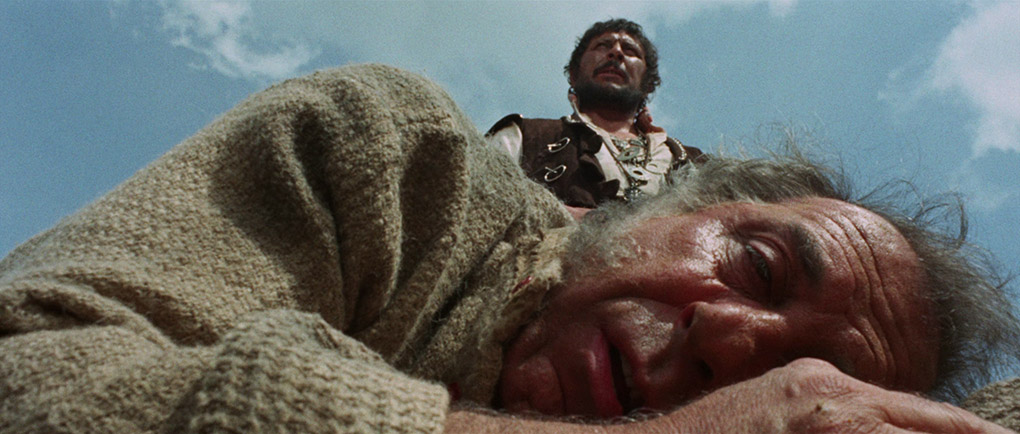
A Very Good Job (15:16)
A new interview with actor and agent Tony Askin, who briefly skips over his journey from being an actor to becoming an agent and relates a few snippets about his work in both roles. It's a somewhat staccato affair that I got very little from, though Askin does kick against the opinions you'll find elsewhere in this set when he says, "The westerns were done the Italian way, therefore… The first three or four by Leone are OK. The rest are no good. We can't make westerns."
Gallery
20 stills and 2 posters for Sartana is Here... Trade Your Pistol for a Coffin
from Mike Siegel's collection.
Disc 4
Commentary by C. Courtney Joyner and Henry Parke
Another fountain of praise from Joyner and Parke for what they regard as the best Sartana film, and they once again highlight all the things that they believe make the film so special. As before, they deconstruct scenes in such detail that they make you aware of things you might not otherwise have considered, but there are also times when they praise the special nature of elements that are far from unique to this film, and read things into sequences that I can't help thinking were probably not intended. It's still an entertaining and enjoyable track, and if you love the film – and it really is a good one – then you're likely to find yourself nodding in agreement the whole way through.
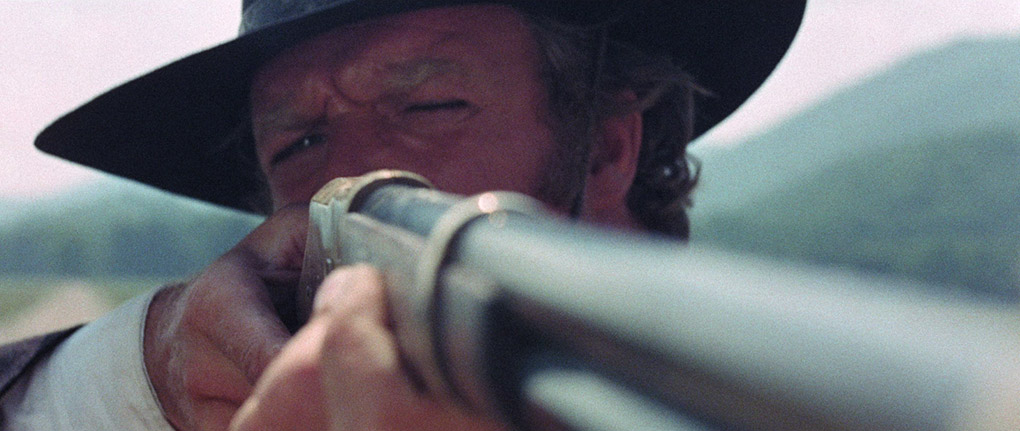
The Man Who Came from the Circus (22:41)
A newly shot interview in which actor and stuntman Robert Dell'Acqua looks back at his circus background and recalls specifics of his stunt work on a number of films, including Robert Altman's Popeye and Lucio Fulci's Zombie.
Gallery
21 high res scans of press images and posters for the film from Mike Seigel's archive.
Disc 5
The Mute Strikes Again (22:01)
A second interview with actor and stuntman Sal Borgese, who recalls in some detail his first real gig as a stunt performer, touches on some of his other early roles, reveals that he was cast as a mute because of his facial similarity to American actor Nick Cravat (who was repeatedly cast as a mute in period movies because his thick Brooklyn accent would have felt incongruous), and has a couple of stories about the friendship he struck up with Yul Brynner on Adiós, Sabata.
Giuliano, Luciano and Me (20:29)
In his second interview in this set, screenwriter Ernesto Gastaldi recalls first meeting and getting to know director Giuliano Carnimeo, with whom he studied directing and screenwriting and subsequently made documentaries with in Spain. He compliments Luciano Martino, meanwhile, with being one of the few honest producers in the business, and once told Sergio Leone to his face that he thought For a Few Dollars More was quite bad because its plot was not logical.
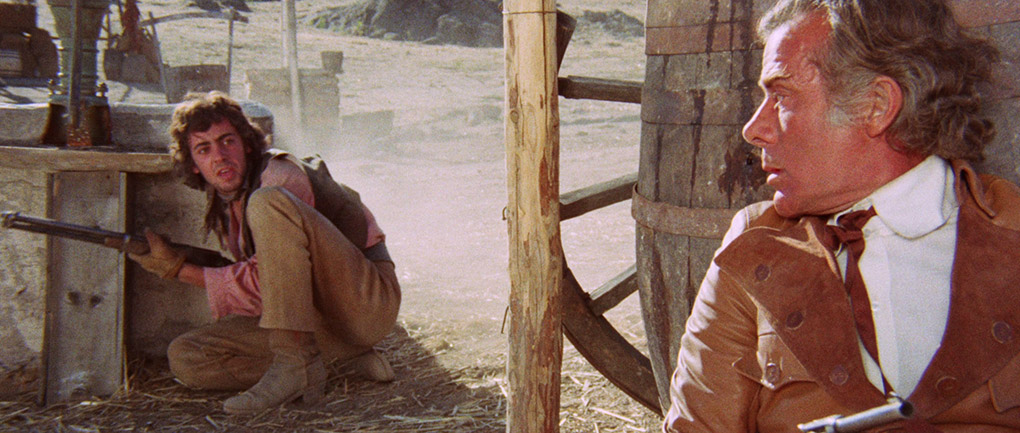
Sartana Lives (24:14)
Announced as an archive piece but framed 16:9 and looking fine, this featurette alternates between interviews with If you Meet Sartana… Pray for Your Death director Giuliano Carnimeo and Sartana himself, Gianni Garko. There's plenty of interest here. Carnimeo talks about how his love of film fuelled his journey to becoming a director, developing the character of Sartana with Garko, and working with favourite cinematographer Stelvio Massi, while Garko reveals why he changed his character's appearance in Have a Good Funeral My Friend… Sartana Will Pay and how he continued to refine him over the course of the series, and even talks about his long-standing love of horse riding. There's more, all of it of interest.
Gallery
20 slides of press materials for the fifth Sartana film from Mike Siegel's collection.
Also included with the release version is an Illustrated Collector's Booklet featuring new writing on the films by Roberto Curti and an extensive Spaghetti Western timeline by Howard Hughes, but this was not available for review.
If you've never seen a Sartana film, then this excellent box set is the perfect introduction, whereas if you are familiar with them then I'll wager this is the release you've been waiting for. As a newcomer to the Sartana series, I was quickly drawn in and ended up thoroughly enjoying all five films. The transfers are terrific, within the small limitations imposed by the source material, and the sheer number and quality of the special features will keep you busy for a week (hence the slight lateness of this review). It's a Limited Edition set with only 2,500 copies available, so if you plan to get your hands on this set I'd do so quickly. Another damned fine job all round from Arrow. Highly recommended.
|